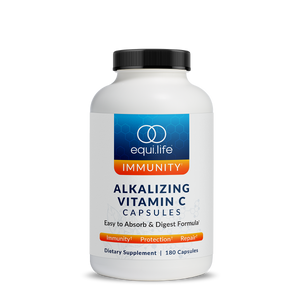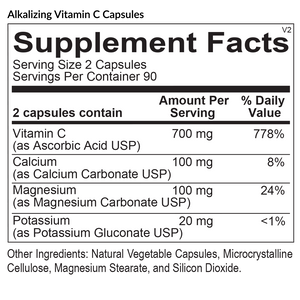




Supplementing with vitamin C is an excellent way to boost immune function, but many supplements are highly acidic and may cause GI distress. Adding alkaline minerals helps create a more balanced and palatable supplement while restoring key minerals and boosting immune function.
Supports robust immunity
Alkaline minerals reduce possible GI upset and boost immune function
Convenient capsule great for travel
Promotes collagen synthesis supporting healthy hair, skin, and nails.
Alkalizing Vitamin C combines a high concentration of this potent antioxidant with even more immune support from key minerals. Vitamin C It has been shown to stimulate both the production and function of white blood cells, especially neutrophils, lymphocytes, and phagocytes. These immune cells are the front line defense against immue challenges and utilize Vitamin C for its protective function against free radical damage. Minerals balance the acidic properties of vitamin c and reduce the risk of potential stomach upset.
Board Certified Doctor of Naturopathy
Founder & CEO, EquiLife
MMS, PA-C, IHP-2M
Vice President of Health Coaching, EquiLife
We know that you are going to see and feel the difference when using our premium line of EquiLife supplements, so much so that if you don't believe what you've received is the absolute best you've ever used, you can simply ship your products back within 60 days for a full refund -- even if it's just the empty bottles! Excludes Shipping.
Prop 65
WARNING California's Proposition 65


